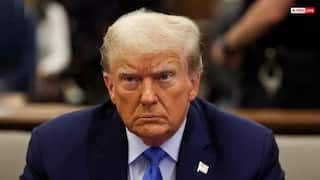Putin's Controversial Amendment That Paved Way For His 5th Term As Russian President, Potential Reign Until 2036
Vladimir Putin began his fifth term as Russia's President, solidifying his grip on power through controversial legislation wherein he effectively reset his term limits, allowing him to potentially serve until 2036.

Vladimir Putin commenced his fifth term as Russia's leader on Tuesday, consolidating his grip on power at a grand Kremlin inauguration ceremony. This event marked the initiation of another six-year tenure for the 71-year-old statesman, solidifying his status as the longest-serving Kremlin leader since Josef Stalin, reports the news agency AP.
In a solemn gesture at the Grand Kremlin Palace, amidst a meticulously selected audience of dignitaries, Putin vowed to uphold the Russian Constitution, symbolically placing his hand upon it.
ALSO READ | Vladimir Putin Commences Fifth Presidential Term Amid Ukraine War, Says Leading Russia A 'Sacred Duty'
Controversial Legislation That Extended Putin's Rule In Russia
The controversial legislation enabling Putin's extended rule was signed in 2021 after a year-long process that critics deemed a blatant power move. This move effectively "zeroes out" Putin's past terms, allowing him the potential to serve two more consecutive terms after his previous tenure concluded in 2024, The Guardian reported. Notably, the law stipulates that previous terms, including the ongoing one, are not counted towards the new limit.
The amendment officially restricts Russian citizens to serving only two presidential terms in their lifetime, aiming to prevent the kind of political maneuvering between the presidency and the prime ministerial position that Putin utilised earlier in his political career.
However, a noteworthy aspect of the law is that it does not take into account the terms served before its implementation. Consequently, Putin's previous four terms, including his current one, are not counted towards the limit. This provision effectively allows Putin the opportunity to serve two additional terms, a move that has been colloquially referred to by Russians as "zeroing out" his terms.
The previous version of the Russian constitution would have mandated Putin to step down in 2024.
How Putin Amended Russia's Constitution To Secure Terms Extension
In January 2020, Putin opened the constitutional debate by outlining a series of amendments. He drew parallels with Franklin D. Roosevelt's four-term presidency in the United States at the time of the Great Depression and World War II. Putin argued that in times of crisis, stability takes precedence over term restrictions.
“In conditions when a country is experiencing such shocks and difficulties, of course stability is perhaps more important and must be a priority,” Reuters quoted Putin as saying.
In March 2020, an unexpected turn came up with a last-minute proposal envisaged re-setting the clock for presidential terms in Russia.
"The most important change was added by a surprise last-minute amendment, tabled by United Russia deputy Valentina Tereshkova – the first-ever woman to go into space – during the third and final reading. Citing the need for stability, she suggested that Putin's previous presidencies should not count towards the two-term limit, thus opening the door to his remaining in power for 12 more years after his fourth presidency ends in 2024," the European Parliament's briefing reads.
After the mandatory three readings in the Duma, a bill to that effect was adopted by a near-unanimous vote in both houses on March 11, 2020. As mandated by the Russian Constitution, the bill was also put to the country's 85 regional parliaments which also extended their unanimous approval.
While there was no constitutional requirement to do so, the alterations to the Russian Constitution were endorsed via a referendum in 2020, with over 78% of the vote in approval. According to a report by The Guardian, Russians were asked to choose in a single vote whether they support a package of amendments that include pension and minimum wage boosts, a modest reorganisation of government, a constitutional mention of “faith in god”, a ban on gay marriage, exhortations to preserve Russian history, and a ban on top officials holding dual citizenship.
Notably, the commercials for the vote barely mentioned that it would also reset term limits for Putin, who has been ruling Russia since 2000.
The report claimed that it wasn't an official referendum and the rules were being custom-designed.
"Unlike in normal elections, voting is allowed online and takes place over a week, between 25 June and 1 July," the report stated. Amid the coronavirus pandemic, some voting officials decided it would be safer to collect ballots outdoors with ballot boxes on tree stumps, in the boots of cars, in public buses, and on plastic patio furniture.
Reportedly, the raffles and prize giveaways. According to the Guardian, Instagram, and TikTok influencers claimed that they were offered millions of roubles by shady middlemen to encourage young followers to vote.
Putin's prolonged stay in power was previously facilitated by alternating between the roles of President and Prime Minister. This maneuver allowed him to sidestep term limits after his initial two consecutive terms ended in 2008. Subsequently, the presidential term was extended to six years, aligning with Putin's two successive terms, which spanned from 2012 to 2024.
Since taking office in 2000 following Boris Yeltsin's resignation, Vladimir Putin has held unparalleled power in Russian politics. If he continues to rule until 2036, Putin's tenure will eclipse that of Joseph Stalin, who ruled the Soviet Union for 29 years, establishing him as the longest-serving Moscow leader since the era of the Russian empire.
Related Video
Punjab News: AAP Leader Shot Dead During Wedding in Amritsar
Top Headlines





































